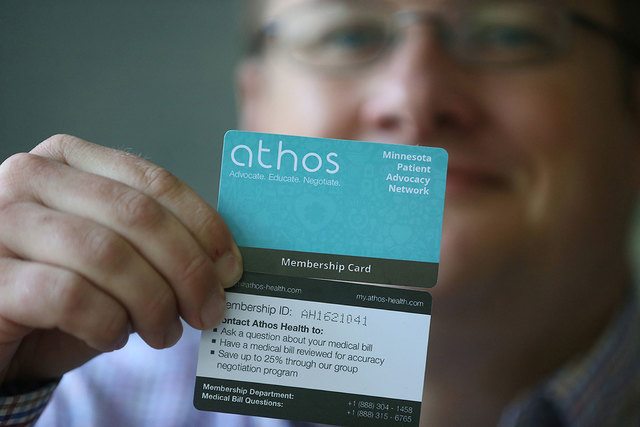MINNEAPOLIS — Hospitals and clinics don’t always get it right when they send bills to patients.
And with all the codes and jargon on medical bills, it can be tough for consumers to spot the mistakes, let alone get them fixed.
Athos Health, a startup based in St. Paul, wants to help people review their medical bills so patients don’t wind up paying hundreds or thousands of dollars in unnecessary out-of-pocket costs.
Those costs are more likely as more health insurance policies feature high deductibles where patients must spend thousands of dollars out-of-pocket before full coverages kicks-in.
Jonathon Hess, one of the company’s co-founders, said patients need help deciphering bills because the system really wasn’t designed with individual consumers in mind.
“It was built up as a business-to-business industry,” Hess said in an interview, referring to the health care providers that generate bills and the insurance companies that provide most of the payment. “Now, because of the rise of out-of-pocket expense, the consumer is getting a bigger voice, but the providers aren’t set up to deal with that.”
In 2015, 96 percent of people with private employer plans in Minnesota had a deductible with their coverage, up from 52 percent in 2002, according to the Minnesota Department of Health.
The average individual deductible in these plans last year was $1,819 — up from $1,419 in 2014, according to an analysis by the department’s Health Economics Program.
The trends mean that individual patients have a much greater chance of needing to pay a medical bill out-of-pocket. Estimates on the frequency of errors in those medical bills vary widely, said Betsy Imholz of Consumers Union.
“I’ve seen the American Medical Association estimate it at 7 percent, but others would put it much higher,” Imholz said via email. “Hospital bills are particularly known for inaccuracies, with some estimates showing 90 percent have errors.”
Hess, 41, of St. Paul worked for more than 15 years as a health care consultant, including work on systems that hospitals and clinics use for issuing and collecting bills.
For Hess, the idea behind the business came in part from personal experience.
When his daughter was born about six years ago, she needed surgery to fix a congenital heart defect. The hospital made a mistake when trying to get paid, Hess said, so the medical center wound up trying to bill him for more than $100,000.
Hess knew how to get the matter resolved without paying. Athos Health can help people facing huge surprise bills, too, although he expects to help more people with smaller-dollar mistakes that are tougher to catch.
“When a hospital or insurance company makes a $200 mistake, it falls on the consumer to catch them or pay for them,” he wrote in an email.
Beyond checking for mistakes, Athos Health can provide patients with information about how costs for a particular service compare with rates elsewhere. Patients can ask the company to negotiate with a clinic or hospital to see if a discount is possible.
“Consumers unwillingly pay higher prices for the same service at the same provider because of a contract between the insurer and health care provider, which the consumer is not a party to or privy to viewing,” Hess said via email. “If everyone paid the same rate for the same procedure at the same health care provider, we would not offer this service.”
Hess and two co-founders, who also were health care consultants, started testing the business concept with friends and family in 2015. They established the business earlier this year as a limited liability company.
Currently, Athos Health is making the service available to people through their employers without a subscription fee. When they catch a mistake, the company retains 25 percent of the savings up to $500.
Starting this fall, the model will shift. Employers will pay a fee for the service, Hess said, and Athos Health will return 100 percent of the savings to individual patients.
Currently, companies with a collective workforce of about 1,000 employees have signed up for the service, Hess said. Athos Health asks them to submit every medical bill for review — smartphone photos of bills can be submitted securely through the company’s website, Hess said.
One employer using the service is Innovate Surfaces, a second-generation family business in Hastings that makes and installs custom countertops.
Co-owner Kellie Akins said the service makes sense because most consumers are intimidated by the prospect of going up against a hospital or clinic to argue a medical bill.
“You have to understand it. You have to know the codes. You have to know how to approach it,” Akins said. “The average person doesn’t … have the time to do it.”



